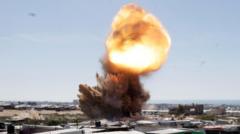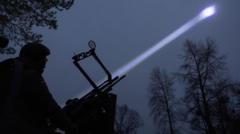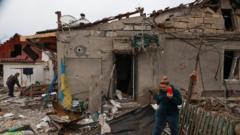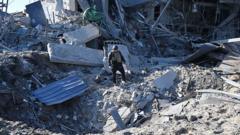The struggle to secure a lasting ceasefire in Ukraine is marred by a history of unfulfilled agreements and mutual distrust, complicating any efforts toward peace. Despite recent attempts, including a 30-hour truce, the fundamental issues underlying the conflict remain unresolved.**
History of Failed Ceasefires in Ukraine Continues to Complicate Peace Efforts**
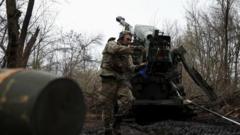
History of Failed Ceasefires in Ukraine Continues to Complicate Peace Efforts**
Ongoing ceasefire negotiations in Ukraine highlight deep-rooted mistrust and persistent failures, as both sides accuse each other of violations and preconditions.**
The ongoing conflict in Ukraine has been plagued by failed ceasefire attempts, each highlighting an array of complicating factors that make peace negotiations increasingly difficult. The most recent ceasefire orchestrated by Russian President Vladimir Putin was supposed to last through Easter; however, it reportedly ended within 30 hours, marred by allegations of violations from both Ukraine and Russia.
Following this brief halt in hostilities, Ukrainian President Volodymyr Zelensky suggested the format could be extended, demonstrating the difficulties in achieving even temporary pauses in fighting. Past efforts, including a 30-day ceasefire proposed by the United States, illustrate the recurring unfulfilled nature of peace initiatives. Russia insists on various conditions, such as halting Ukrainian rearmament and addressing the underlying causes of the conflict, further complicating the pathway to a more comprehensive agreement.
A major factor contributing to the stagnation of negotiations is the extensive history of mistrust between the two nations, exacerbated by prior instances where multiple ceasefire agreements have been violated. Zelensky has pointed out that over 25 ceasefire accords have been breached by Russia since the conflict’s intensification in 2014, indicating a pattern of behavior that undermines trust. Conversely, Russian officials have labeled the Ukrainian leadership as incapable of enforcing compliance with these agreements.
Analysts argue that responsibility for the failure of these truces primarily lies with Russia, though they also acknowledge that Ukraine has at times contributed to the tensions. Statements from both nations exhibit a lack of willingness to meet halfway, as each holds the other accountable for the ongoing conflict. Russia's stance remains firm, insisting that any cessation of hostilities is contingent on achieving its strategic objectives in Ukraine, including the establishment of a demilitarized, neutral state.
The roots of distrust and conflict date back to 2014 when Russia's invasion of Ukraine was a blatant violation of existing treaties. Since then, both sides have accused each other of treachery and of backtracking on agreements. The failure of early ceasefire arrangements, including the original Minsk agreements, sets a precedent of skepticism that lingers heavily over current discussions.
Looking ahead, Putin's recent truce appears to merely offer a brief respite rather than a genuine step towards a lasting peace, casting doubt on whether effective negotiations can materialize in the near future. Former US President Donald Trump once remarked the importance of a cohesive agreement, but the complexities of the situation leave open questions about the sincerity of both parties in pursuing a fruitful resolution.
With Russia maintaining its demand for resolution of what it considers the "underlying causes" of the conflict, the path to genuine peace remains obstructed by the same challenges that have historically thwarted progress, suggesting that the cycle of escalation and temporary lulls may continue indefinitely unless a breakthrough in negotiations is achieved.
Following this brief halt in hostilities, Ukrainian President Volodymyr Zelensky suggested the format could be extended, demonstrating the difficulties in achieving even temporary pauses in fighting. Past efforts, including a 30-day ceasefire proposed by the United States, illustrate the recurring unfulfilled nature of peace initiatives. Russia insists on various conditions, such as halting Ukrainian rearmament and addressing the underlying causes of the conflict, further complicating the pathway to a more comprehensive agreement.
A major factor contributing to the stagnation of negotiations is the extensive history of mistrust between the two nations, exacerbated by prior instances where multiple ceasefire agreements have been violated. Zelensky has pointed out that over 25 ceasefire accords have been breached by Russia since the conflict’s intensification in 2014, indicating a pattern of behavior that undermines trust. Conversely, Russian officials have labeled the Ukrainian leadership as incapable of enforcing compliance with these agreements.
Analysts argue that responsibility for the failure of these truces primarily lies with Russia, though they also acknowledge that Ukraine has at times contributed to the tensions. Statements from both nations exhibit a lack of willingness to meet halfway, as each holds the other accountable for the ongoing conflict. Russia's stance remains firm, insisting that any cessation of hostilities is contingent on achieving its strategic objectives in Ukraine, including the establishment of a demilitarized, neutral state.
The roots of distrust and conflict date back to 2014 when Russia's invasion of Ukraine was a blatant violation of existing treaties. Since then, both sides have accused each other of treachery and of backtracking on agreements. The failure of early ceasefire arrangements, including the original Minsk agreements, sets a precedent of skepticism that lingers heavily over current discussions.
Looking ahead, Putin's recent truce appears to merely offer a brief respite rather than a genuine step towards a lasting peace, casting doubt on whether effective negotiations can materialize in the near future. Former US President Donald Trump once remarked the importance of a cohesive agreement, but the complexities of the situation leave open questions about the sincerity of both parties in pursuing a fruitful resolution.
With Russia maintaining its demand for resolution of what it considers the "underlying causes" of the conflict, the path to genuine peace remains obstructed by the same challenges that have historically thwarted progress, suggesting that the cycle of escalation and temporary lulls may continue indefinitely unless a breakthrough in negotiations is achieved.

